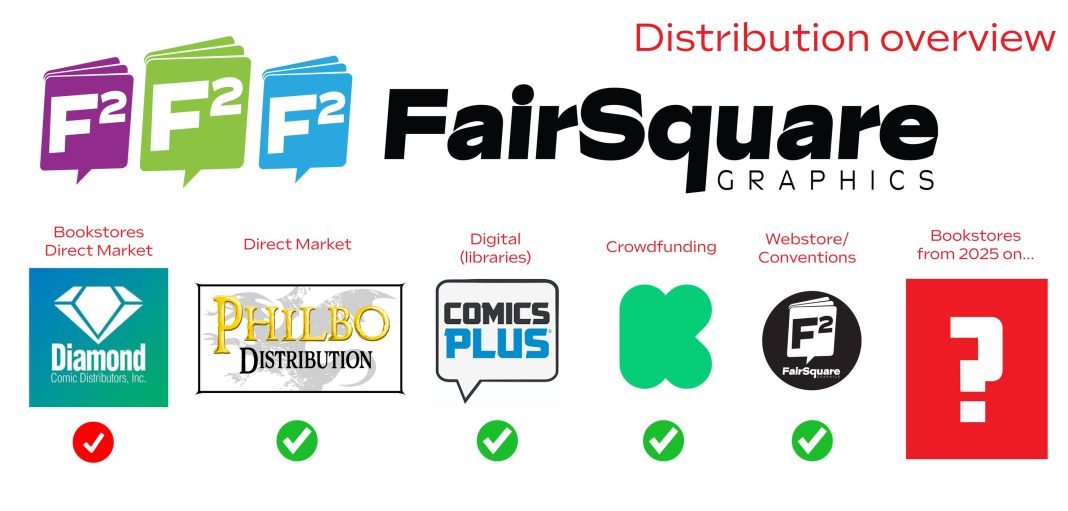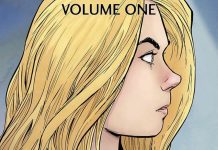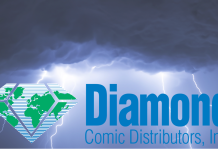In practice, however, this freedom remains largely theoretical. There are still many barriers to getting books into the world. But I believe that publishing a work—making it accessible to readers—should be considered a fundamental right.
Which brings me to the issue of distribution in our great country. I’ve always known that the book and periodicals distribution system in the United States was far from perfect. But following the collapse of our current distributor, Diamond Comics/Diamond Books, I began exploring new paths to ensure that FairSquare Graphics titles remain accessible to as many readers as possible.
What I discovered is not pretty. And it’s high time to talk about it. First, a word about the Diamond Drama. It’s been painful since it started mid-January. But the writing was on the wall and I knew we’d have to live without Diamond for a while. In 2024, we experienced a wave of returns that was absolutely insane and showed signs that something was going wrong. For eight weeks last Spring, we did not get a cent from book distribution. In order to keep publishing and survive, we looked at other channels: more crowdfunding, more conventions, more direct sales.
That policy was carried on in 2025. So when Diamond announced bankruptcy on January 14, I was not surprised and we had a plan to keep operating as best as we could by other means.
Diamond has been a relatively good partner for the past four years. Especially in the beginning. But in publishing, you have to learn how to pivot quickly. Margins are tight. Expenses are high. Diamond’s fall from grace came from its flawed vision of the market. And its incapacity to reinvent itself after its bigger vendors left for greener pastures. But truth is, Diamond had the best deal.
No other distributor was able to be a one-stop shop for two major channels like bookstores and direct market (comic book shops). None paid as fast as Diamond (30 days average, if not faster). And their vendor/inventory tools were really great.
Now after a whole roller-coaster soap opera style five months, Diamond has been sold in pieces to AdPopulum and Universal. The latter did not take over the books and comic book division. And the former bought it to, as it seems, fold it, and just keep the warehouse. What a waste.
For dozens of smaller publishers like ourselves, this means one thing: we’re on our own. When your overall business is between $50,000 and $200,000 a year, big distributors are not for you.
As I started looking at solutions to replace Diamond, at least for the book market, I quickly understood that if you can’t publish 30 to 50 titles a year, you’re left with very little options. And the ones you have are expensive and not efficient.
A couple of distributors offered me a “deal” that would see them absorb 75% of our cover prices (including retailer discount) with a payment at net 90 days. Another one has a more affordable solution with “only” 65% but charges a flat fee of $100 for each new title you submit and pays at 100 days.
Of course, there would be some hidden fees in the mix (handling, warehouse,…).
So I candidly asked if, for that price they’d guarantee a higher volume and if so, what could we expect. “We can make you sell more books” was usually the answer. No metrics. No goals. No accountability.
From a business standpoint, this is not great.
Hence the question: don’t you think that publishing deserves better?
Obviously, yes. But how do we do with the cards we have in hand?
The easiest decision in the history of decisions was dealing with the Direct Market (aka comic book stores). My friend Phillip Russerttl has been ramping up a distribution company for a few months, Philbo Distribution. He also saw Diamond coming to an end and decided to step up. I love this guy. He cares about stores, about creators, about his peers. FairSquare Graphics will be then distributed through them on the Direct Market as part of a non-exclusive agreement. We’re joining Phil’s label, Philbo, as are veteran indie publishers such as Zenescope, Antarctic Press, Monstrous Books and Crusade. Others may follow.
Our good relationship with ComicsPlus will carry on and our titles will still be available on LibraryPass in Digital form (except light novels, alas). And we’re going to distribute everything else directly for the time being.
We started talking to several stores and thanks to our convention business, we’re selling hundreds of books every weekend. We’ll also keep selling books on the streets of New York this year.
This is not ideal and it’s clearly exhausting. But at least, we can take the time to find a distribution solution that suits us and is not confiscatory.
I hope a distributor rises from Diamond’s ashes. Not just because our industry deserves it. But because this business needs serious disruption.
Creators and publishers cannot be at the mercy of a system that restricts the consumer’s right to choose their content.
A lot of industries have been disrupted by digital tools and techniques. Why would books and graphic novels be left out of this revolution? Can’t we optimize distribution? I think so. Other countries have different systems, can’t we take inspiration from them? See what works? And if, due to the size of the country, no company’s big enough, can’t we get a a web of smaller-human sized distribution for a group of states or one of the coasts?
There IS money in publishing. There IS money in distribution. But I guess there’s some self-examination to do. Could a non-profit be a solution? I don’t know. I’m just throwing ideas.
People NEED to have access to different types of content. Not just branded material from faceless corporations. Independent publishing is vital to creativity and diversity.
Where’s the freedom of speech if you can only find a couple of flavors on stands?
I always tell people: you can like or dislike our books, but I can’t accept that you can’t find and buy them.
Accessing culture everywhere should be our right as consumers. No gatekeeping allowed. Comics, graphic novels, light novels, novels are culture.
Let’s not make it a pleasure for a few curious people like it was decades and centuries ago.
Let’s manifest a healthy and strong distribution system for all that will guarantee our right to choose what we want to read.









